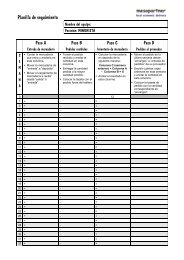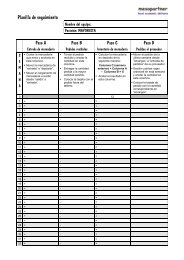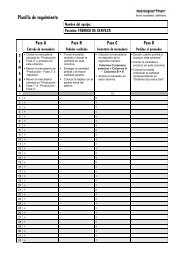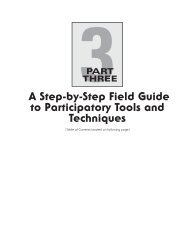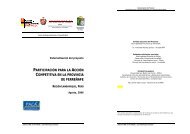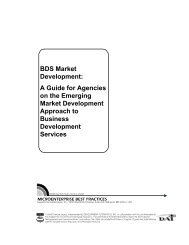McCormick+Schmitz Handbook for value chain research on - PACA
McCormick+Schmitz Handbook for value chain research on - PACA
McCormick+Schmitz Handbook for value chain research on - PACA
You also want an ePaper? Increase the reach of your titles
YUMPU automatically turns print PDFs into web optimized ePapers that Google loves.
15. Working with public agencies<br />
The title of this chapter recognises that you will need to work with public agencies in the<br />
course of your <str<strong>on</strong>g>research</str<strong>on</strong>g>. The reas<strong>on</strong>s are obvious: first, public agencies provide data <strong>on</strong><br />
trade, producti<strong>on</strong> and employment; the importance and limitati<strong>on</strong> of this data source was<br />
discussed in previous chapters. Sec<strong>on</strong>d, public agencies influence the earning<br />
opportunities of home-workers, directly or indirectly. This occurs in numerous ways,<br />
through regulati<strong>on</strong>s (e.g. registrati<strong>on</strong> requirements), policies (e.g. trade policy), direct<br />
assistance (e.g. provisi<strong>on</strong> of training) or harassment (e.g. extracting bribes). And there are<br />
numerous public actors, ranging from municipal organs, to nati<strong>on</strong>al ministries, to<br />
internati<strong>on</strong>al (multilateral) organisati<strong>on</strong>s like the ILO or the Commissi<strong>on</strong> of the European<br />
Uni<strong>on</strong>. Their importance to you will depend <strong>on</strong> the questi<strong>on</strong>s you are trying to answer<br />
and the specific c<strong>on</strong>text in which ‘your’ home-workers are operating. General guidelines<br />
<strong>on</strong> what to cover and how to c<strong>on</strong>duct the <str<strong>on</strong>g>research</str<strong>on</strong>g> are there<str<strong>on</strong>g>for</str<strong>on</strong>g>e hard to give. The purpose<br />
of this chapter is to give some examples of issues <strong>on</strong> which you may need to work with<br />
public agencies. As in previous chapters, keep in mind that these issues should be<br />
<str<strong>on</strong>g>research</str<strong>on</strong>g>ed <strong>on</strong> the basis of various sources; in other words do not just collect data and<br />
views in public agencies but also from those affected by their acti<strong>on</strong>.<br />
• What are the registrati<strong>on</strong> requirements <str<strong>on</strong>g>for</str<strong>on</strong>g> home-workers? What are the costs and<br />
benefits of registrati<strong>on</strong>?<br />
[Readers: please provide examples of registrati<strong>on</strong> requirements in the locality you<br />
are familiar with and indicate which public agencies provide in<str<strong>on</strong>g>for</str<strong>on</strong>g>mati<strong>on</strong> to deal<br />
with the above questi<strong>on</strong>s. DM/HS]<br />
• How are home-workers c<strong>on</strong>sidered in local labour legislati<strong>on</strong>? Are there labour laws<br />
that push women into homeworking?<br />
A key questi<strong>on</strong> is whether and how homeworkers are treated in local labour<br />
legislati<strong>on</strong>. Are they classified as independent c<strong>on</strong>tractors, employees, in<str<strong>on</strong>g>for</str<strong>on</strong>g>mal<br />
workers, or – more likely - are they simply ignored? If homeworking is comm<strong>on</strong><br />
in your area, there will probably be some<strong>on</strong>e in the Ministry of Labour (or its<br />
equivalent) who can point you to the relevant legislati<strong>on</strong> and explain<br />
homeworkers’ rights under the law.<br />
86





